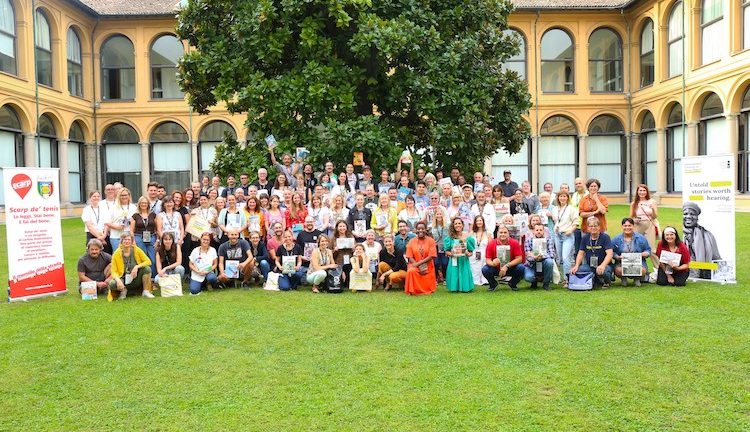By Mike Findlay-Agnew
The writer is the Chief Executive of the International Network of Street Papers.
GLASGOW | 1 March 2024 (IDN) — You may not be aware of it, but newspapers and magazines that are sold on the streets by homeless people are part of a global phenomenon. In 500 cities and towns, across 35 countries, ‘street papers’ are being sold as part of the solution to the poverty crisis we are experiencing throughout the world.
From our offices in Glasgow, Scotland, the International Network of Street Papers (or ‘INSP’ as we call ourselves) operates as the charity and membership body representing all street papers. We currently have 92 member organisations, with over 700 street paper staff as part of our network.

Our charity has a mission to support the global street paper network to help alleviate poverty and build a movement for social change. We run events both on and offline that connect street paper staff—from Australia, Brazil, Germany, Japan, the UK, the USA, and Taiwan, and everywhere in between—allowing them to learn from each other and create new innovations to tackle some of the world’s biggest challenges.
INSP has a strong journalistic ethos. We run a news wire service publishing and sending out news stories, features, and images to all 92 street paper newsrooms internationally. Through our relationship with Translators Without Borders, an agency that provides volunteer translators, we translate these articles into the 24 different languages spoken and written within our network. Editors and journalists at street papers are able to use these news stories to populate the pages of their publications with. The publications are then sold on the streets for a profit by people experiencing homelessness, poverty, and other forms of marginalisation.
Given our social justice aims, the emphasis of our news coverage is on some society’s biggest issues, including: the Israeli-Palestine conflict; climate change; LGBTQ+ rights; immigrants; Artificial Intelligence (AI); criminalisation of homeless people; to name a few.
Challenging people’s perceptions
For too long, homeless people have been ‘othered’, by passers-by on the streets and the mainstream media. Often looked down upon. Often ignored. Through our journalism, we are therefore championing the often-unheard voices of homeless people in the media and wider public narrative. We aim to challenge people’s perceptions about homelessness and poverty, making them more informed of what the reality is like.
One great example of this comes from the United States. INSP has run an editorial column called Housing for the People, giving people the chance to tell their own stories of hardship and being homeless, in their own way. Coaching and mentoring is provided and, critically, we pay for each published article. Treating each contributor as a professional journalist.
The street paper concept is an enterprising one taking us beyond the idea of a charity “hand-out”. Most vendors buy the street papers themselves, selling them on at a profit that they keep. It is ultimately an empowerment model, putting people in charge of their own working lives.
Countless examples of innovations
Since joining the street paper network just over 18-months ago, I have been struck by the wide wrap-around support street papers provide people beyond the transactional aspect: emotional health and wellbeing support; practical assistance with finances; and practical advice about housing. There are also countless examples of innovations happening around the world. For instance, in Mexico City, street paper Mi Valedor has partnered with local organisations to ensure vulnerable communities can access free health services in a non-discriminatory way.
Street papers have been around for almost thirty years, supporting thousands of people out of poverty. Despite this, people often ask me about the relevance and sustainability of the street paper model in an increasingly digital world. In answer to this, I talk about how street paper staff are constantly needing to innovate and keep up with modern technology to ensure their survival.
Here in the UK, for example, The Big Issue embraced the trend for becoming a cashless society. A partnership with Zettle by PayPal meant when vendors could get back on the streets, they had the means to receive digital payments through a ‘Tap To Pay’ system. Two-thirds of Big Issue vendors can take cashless payments, with plans to expand this further in the future.
Street papers are also really embedded in their own local communities and have links to organisations locally in support of their aims.
No matter where you live in the world, you would be hard pushed not to notice the increased prevalence of homelessness in your own towns or cities. Street papers are, and will remain, a part of the global solution to poverty. It’s important you purchase them, speak to your local vendors and sellers of street papers, and also read the contents of the pages. That way, you are also part of our global movement of tackling homelessness and poverty. [IDN-InDepthNews]
For more details of INSP and our network, see: www.insp.ngo. Please consider a monthly donation to support our work tackling homelessness and poverty: https://www.insp.ngo/donate
Photo: “Street paper staff at the 2022 Global Street Paper Summit in Milan, Italy. Credit: Andrea Cherchi / INSP”
IDN is the flagship agency of the Non-profit International Press Syndicate.


